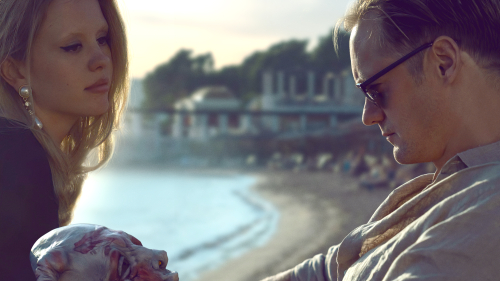
Neon
MOVIE REVIEW
Infinity Pool (2023)
Brandon Cronenberg's previous film, "Possessor," had moments of gore and violence, while manipulating you mostly through drastic quiet unease about mind and body; a film in which Andrea Riseborough calmly stared at you while you were staring at her. "Infinity Pool" barges in and breaks the window and makes a mess on the floor; a film in which Mia Goth screams at you about your unease until you decide that maybe you don't feel so bad. Emboldened, reasonably enough, by the last film's success, Mr. Cronenberg now attacks on multiple fronts. In "Infinity Pool" there are clones and doubles and sleight of hand about which is which. There are rich white people going off the deep end into drug-fuelled violence in a country offensively poorer than Los Angeles. There's a bag of storytelling tactics, harsh editing and strobe lighting and subliminal glimpses of genitalia, the tool kit that gets called experimental – but really isn't because it isn't chasing a state of mind, just an instant of disorientation, not the same thing. All these flammable items go into the test tube, without catching fire.
The plot is deliberately murky, but involves author James (Alexander Skarsgård) and wife, Em (Cleopatra Coleman), on vacation at a beach resort in somewhere called Li Tolqa, where the hotel is surrounded by barbed wire to keep the locals out and the approach of the rainy season looms apocalyptically. They meet Gabi (Ms. Goth) and Alban (Jalil Lespert), superficially friendly but probably not. James accidentally runs over a local farmer and discovers that guilty rich people can buy their way out of a death sentence by having a clone made, with the clone then being executed instead. Witnessing his own slaughter has a big effect on James – "You're completely transformed," says Alban, giving the audience a pointer. Gabi and Alban and some of their friends then uncork vast seething resentments about the country and its legal system and its ghastly foreign people for a murderous rampage, with James pulled along. The feeling is mutual: "Our country is not a playground for foreign children," says Li Tolqa policeman Thresh (Thomas Kretschmann), uttering the subtext out loud.
Echoes from the past roll in – for the viewer. Cloning and doubling are already natural sci-fi hooks when identity and its politics are under cultural discussion; more to the point last year's Sundance film "Dual" had Karen Gillan clone herself for legal purposes and then have to kill the clone for comedic purposes, paddling in the waters that Mr. Cronenberg dives into. Rich white folk from the Global North flirting with torture porn in seedier non-Anglophone nations is a spicier seam of grindhouse, one that had its moment two decades ago in the wake of 9/11 and might be worth careful thought in the current climate. Not everyone agreed that Eli Roth's "Hostel" franchise counted as social commentary at a time when the U.S. government was hanging prisoners upside-down in Guantanamo Bay; but Mr. Roth knew the live wire he was touching by forcing both fear and desire for vengeance onto his audience. The ways in which foreign children treat other countries as a playground have hardly lessened since.
Mr. Cronenberg is more interested in the visual than the thematic, leading to visuals that could prompt a giggle, as when Gabi gets Biblical and makes James spill his seed upon the ground, which didn't work out so well for Onan either. The two of them engage in a psychodrama that's mostly psycho, and deeply Northern. Ms. Goth, skin and eyebrows pristinely pale, looks like a Nordic angel of death, while Mr. Skarsgård looks Nordic because he was made that way.
Comments